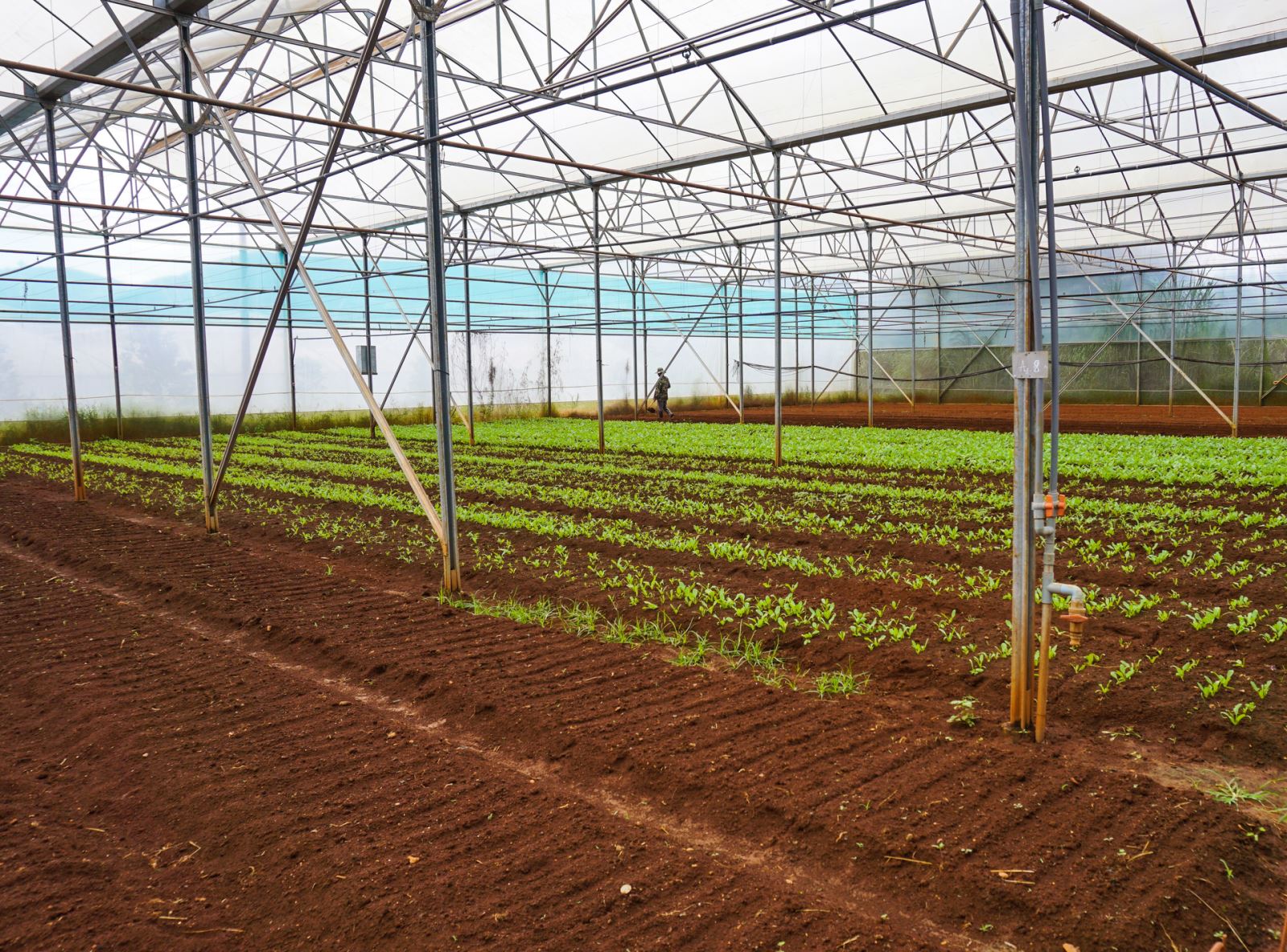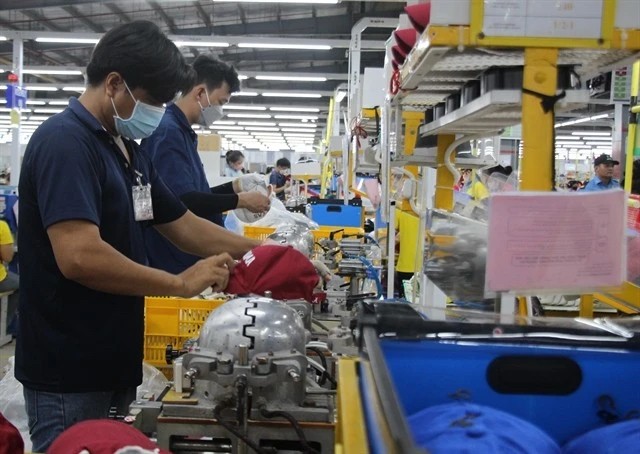In Vietnam, an organic farmer tackles an agricultural paradox

Thang stands at the edge of his corn field in Ka Don Commune, Duc Trong District, Lam Dong Province.
Demand is high and organic farming benefits are self-evident, but government and consumer support has been tepid, thus far.
Nguyen Quoc Thang sometimes wonders what the fuss is all about.
In fact, instead of welcoming it, he is downright worried about the publicity the press has been giving him, because, "sometimes they write about me and my work, and I cannot even understand what they are talking about."
Thang’s work is very simple. He is a farmer who grows vegetables.
The “complication,” if any, arises from a crucial difference between him and most other farmers in the country.
Thang has chosen to engage in organic farming, eschewing the use of chemical fertilizers and pesticides.
His farm, the Thien Sinh Veggie Farm, is about an-hour-and-a-half drive away from the tourists’ sweetheart town of Da Lat. It is located in Don Duong District, long known as a veggie hub in the Central Highlands province of Lam Dong.
The district comes into view as a series of lush green, vast carrot farms chequered with white ‘air box’ bubbles shielding what look like escarole and lettuce.
Don Duong District, long known as a veggie hub in the Central Highlands province of Lam Dong, supplies around 800,000 tons of vegetables a year.
From a distance, Thang’s eight hectare patch of land looks like an oasis, even amidst all the greenery that surrounds it.
Sitting on top of a hill, the farm is surrounded by grasses taller than humans and two rows of cowsheds erected on the slope. Phuong, one of Thang’s employees, said the arrangement was strategic.
"The grass is a natural buffer zone that keeps out chemical sprays from the fields down there," he told VnExpress International, "and it is also used to feed this herd of oxen," he said, gesturing at over a dozen heads of cattle raised only for manure composting.
The vegetable garden was formerly coffee plantation, a crop that the province and the region are well known for.
When Thang set out to convert the coffee plantation into a chemical free vegetable farm, it was a risky move.
"Something as simple as figuring out the diet of a vegetable could be a real struggle," said Phuong, who has spent six years on the eight-year-old farm.
As they stopped using “drugs,” they had to pay extra attention to "listening” to the crops. "For instance, how much compost is needed to grow this arugula? What about that Chinese broccoli? And then, to make things worse, the pests came in," Phuong added.
It is not that Thang, Phuong and other workers are inexperienced in growing vegetables. Farming has been a livelihood for generations in their families, but so has been the use of chemical fertilizers and pesticides.
Half of Thang's vegetables are grown in ‘air boxes’ to shield them from harmful pests and chemical sprays from the neighborhood. Pictured are beds of bok choy.
It was in the 1950s and 1960s that high-yielding hybrid varieties of rice and other crops were introduced to Vietnamese agriculture. And although they offered at least double the productivity in comparison to traditional crops, they also required more inputs of chemical fertilizers and pesticides, explained Associate Prof. Nguyen Minh Chau, former director general of Southern Horticultural Research Institute (SOFRI).
"That’s the price we had to pay when we chose to pursue the path of high productivity agriculture," Chau told VnExpress International in an email.
Then, after decades of war and a post-war embargo, Vietnam embarked on Doi moi (renovation), and rode the so-called green revolution to become a leading exporter of agricultural produce in the world. This meant that Vietnam also became one of the biggest importers and users of fertilizers, pesticides and other materials.
In the 1950s, Vietnamese farmers reportedly sprayed about 100 tons of pesticide in agricultural production a year. 40 years later, in the 1990s, the number jumped 150 times. Now, every year, they use 70,000-100,000 tons of plant protection products (PPP), and spend at least half a billion dollars importing these from China alone.
The official numbers, however, are only ‘the tip of the iceberg’, according to Nguyen Tho, vice chairman of Vietnam Plant Protection Association cited by local media. "In reality, the amount of PPP smuggled from China and sold in our domestic market is many times higher,” he said.
.jpg)
Don Duong District, long known as a veggie hub in the Central Highlands province of Lam Dong, supplies around 800,000 tons of vegetables a year.
"Not all of chemicals used in agriculture are harmful to consumers, I must make that clear," Chau emphasized. "What’s important are which ones we can use, how much we should use and for how long before we harvest."
But surveys among farmers in the recent years have showed that the country seems to have no functioning brakes on this issue. In 2010, statistics compiled by Vietnam’s Plant Protection Department shows one PPP inspector had to supervise the sale of 290 PPP sellers and their application over an average 100,000 hectares of cultivated land, roughly equivalent to 186,000 football fields.
The spraying of harmful pesticides, herbicides and other products has been left in the hands of farmers, who do so with little or no consultation with experts and officials.
Most of Thang’s vegetable farming peers said in a 2014 survey conducted by the Vietnam National University of Agriculture that they usually sprayed pesticides any time when they saw insects. A majority (85 percent) of vegetable growers "used pesticides based on their own experience", and nearly half (43 percent) used pesticides with concentrations twice the recommended amount,” the survey found. Over 51 percent of vegetable samples were detected with pesticide and heavy metal residues higher than the permitted levels.
Most of the works on the farm is done manually. For instance, weeding is done by hand. No chemical herbicide is used.
In the middle of this ongoing national addiction to agricultural chemicals, Thang’s move to drop all these inputs and go back to the centuries-old labour-intensive farming was greeted with skepticism by family and friends. All his seven brothers pursue chemical-laden farming in hundreds of hectares of vegetable gardens. He is the only sibling going against the tide.
"Of course they all thought my plan was doomed to fail," he said, recalling the reaction he got 12 years ago, sitting in a hut at their edge of his corn field.
"They said it was already hard enough, farming with pesticides and fertilizers, there is no chance for my farm to survive without them."
Yet Thang’s was not an emotional decision.
He could see with his own eyes that the current methods relied too much on fertilizers and pesticides, and farmers’ earnings were affected whenever their prices fluctuated. Eliminating them from production promised more stable costs in the long term.
Plus, businesswise, by offering unique products in the market, his organic produce would have the leverage of new values: "clean" food means better health.
"There are always consumers that are willing to pay extra for what is good for their family," he said.
Not rocket science
Chemicals free farming in the longer term would improve the quality of soil, plants and animals, and the health of people. "The whole neighborhood can benefit from this, not only you and your family," Thang said.
Thang did not go all out for his new, risky venture. He experimented on a 500 square meter piece of land. He practiced perse crop rotations and applied biological products to detoxify the soil after decades of dumping pesticides and chemical fertilizers. He learnt how to compost, "which was common folk knowledge in Vietnam for generations before the boom of chemical use in agriculture."
It took him a few failed experiments and with the help of several Japanese experts he met along the way to figure out natural pesticides like neem oil to repel harmful insects. Big worms were picked manually in the morning.
In 2011, he launched his all organic farm growing 30 varieties of vegetables.
"But when I introduced my vegetables to the market, nobody trusted that they were organic," said Thang.
Organic farming requires investment three times higher than conventional farming, and yields are not as certain.

Most of the works on the farm is done manually. For instance, weeding is done by hand. No chemical herbicide is used.
Although safe food is highly desired in Vietnam with widespread fear of chemically-contaminated food, a "food safety paradox" has cropped up. Despite high demand, safe and organic food still struggles to find customers due to doubts over their authenticity.
For instance, a small study carried out in Hanoi in 2016 by VECO Vietnam found that 97.5 percent of respondents were either worried or extremely worried about food safety. But the market share of safe vegetables in the city was just 3.2 percent of the total veggie consumption. The most important factor, for both sellers and buyers, was not high prices, but the lack of confidence.
Half the respondents said they did not trust even food safety certifications because of the existence of false brands, a non-transparent certification process, unknown origins of produce and lack of faith in the sellers. Or, in Thang’s words, "the market has been in chaos for way too long, consumers are now consumed by fear and suspicion."
He did not go for any certification at first, and began to build his credibility step by step. "I sold the vegetables in small amounts first and at more affordable prices for consumers to be able to taste them," he said. "And the farm is always open if anyone is interested in checking our work."
His friends and a network of business partners were also sent packs of veggies for free. Finally, on the sheer power of word of mouth, his base of regular consumers grew.
Now, eight years later, Thang’s vegetables are sold in a few grocery stores, supermarkets and farm-to-table restaurants in the southern metropolis of Ho Chi Minh City. He deals with distribution partners with year-long fixed prices for his produce, which are based on the input costs and national average prices.
A distributor in Ho Chi Minh City working with Thang’s farm told VnExpress International his produce are two to three times more expensive than the conventionally grown ones. Despite this, they are scarce sometimes, due to the growing demand.
Given the expanding middle class and younger generation concerned about hygiene and food safety, Thang believes in the future of his business. The market for organic agricultural produce in Vietnam is estimated at VND3 trillion ($129.5 milion) a year and counting.
Optimistic, skeptical
However, although he is confident about the future of his enterprise, Thang is half optimistic and half skeptical about the possibility of organic farming proliferating in Vietnam.
On the one hand, "most of the farming is being done by families, which can suit the labor intensity requirement. And our tropical climate makes it easier for us to grow organic produce for sure."
On the other, the vast majority of farmers in Vietnam are smallholders who have little access to finance and have been working for a long time with contaminated soil. To switch to organic farming, in Thang’s experience, requires at least three years of transitioning, which is compounded by the probability of bad weather.
Many farmers have visited his farm to learn the techniques, but most dropped them within just one year, he rued.
"High investment costs are the biggest barrier for us. I was lucky enough to already have the nursery farm running to fund such a long conversion period. But an average farmer, what would they and their family live on in the mean time?"
The Vietnamese government has shown no interest in organic farming beyond feeble rhetorical support.
Associate Prof. Chau recalled: "In 2001 and 2002, I invited Australian experts to Vietnam to provide some training about growing organic rambutan for SOFRI members.
And later I submitted our projects for developing organic agricultural products to the ministry several times, but nobody paid attention despite my persistence.
“As far as I know, they have not approved any of those projects."
The disinterest is also evident in the meager financial support from the government for organic farming. It was only at end of 2018 that the government issued a decree to support organic production in the country, but its focus is on regulating the certification process.
The financial assistance mechanisms mentioned in the decree will take a while to kick off, experts say, given that no further implementation guidelines have been issued.
They also point out that agriculture in general is not appealing for investors from the business sector in Vietnam; only 8 percent of enterprises nationwide operate in the sector, mainly in distribution and logistics. And despite the promising market, only enthusiastic investors, mostly from the cities and with expert knowledge, would pour money into organic agriculture, since production requires big capital and long-term patience.
Just 0.5 percent of Vietnam’s cultivated land and aquaculture land, or around 120,000 hectares, is certified for organic farming.
Thang is half optimistic and half skeptical about the possibility of organic farming proliferating in Vietnam.
In Thang's hometown, Lam Dong Province, the number is just 143 hectares.
"My farm receives visitors all the time," Thang said. "Most are university students, coming here to work for us for weeks to learn the techniques.
"They say they aspire to be safe food growers, or they are full of ideas for agriculture start-ups, and want to jump into organic farming immediately," he said, eyes fixed on the dirt road ahead and turning the wheel away from a massive pothole.
"I tell them they better buckle up. It is going to be a long, bumpy ride."
Recommended
 National
National
Vietnam News Today (Jun. 7): Prime Minister works with Estonian firms to accelerate projects in Vietnam
 National
National
Vietnam News Today (Jun. 6): Foreign Investment in Vietnam Surges in Five Months
 National
National
Vietnam News Today (Jun. 5): PM sets off for attendance at UNOC 3 in France, official visits to Estonia, Sweden
 National
National
Vietnam News Today (Jun. 4): Vietnam - Promising Candidate for Southeast Asia’s Next Powerhouse
 National
National
Shangri-La Dialogue 22: Vietnam Highlights Some Issues of Ensuring Stability in a Competitive World
 National
National
Vietnam News Today (Jun. 3): PM Pham Minh Chinh to Attend UN Ocean Conference, Visit Estonia, Sweden
 National
National
Vietnam News Today (Jun. 2): Vietnamese Trade Mission Sounds Out Business Opportunities in United States
 National
National
